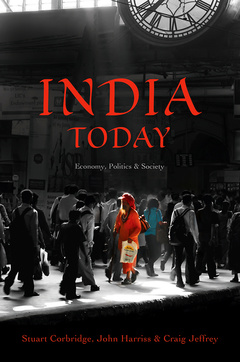India Today Economy, Politics and Society Politics Today Series
Auteurs : Corbridge Stuart, Harriss John, Jeffrey Craig

How and why has this historic transformation come about? And what are its implications for the people of India, for Indian society and politics? These are the big questions addressed in this book by three scholars who have lived and researched in different parts of India during the period of this great transformation.
Each of the 13 chapters seeks to answer a particular question: When and why did India take off? How did a weak state promote audacious reform? Is government in India becoming more responsive (and to whom)? Does India have a civil society? Does caste still matter? Why is India threatened by a Maoist insurgency? In addressing these and other pressing questions, the authors take full account of vibrant new scholarship that has emerged over the past decade or so, both from Indian writers and India specialists, and from social scientists who have studied India in a comparative context.
India Today is a comprehensive and compelling text for students of South Asia, political economy, development and comparative politics as well as anyone interested in the future of the world's largest democracy.
List of Figures and Tables vii
Abbreviations ix
Preface and Acknowledgements xiii
1 Making Sense of India Today 1
Part I: Economy
2 When and Why Did India Take Off? 23
3 How Have the Poor Fared (and Others Too)? 47
4 Why Hasn’t Economic Growth Delivered More for Indian Workers? 80
5 Is the Indian State Delivering on Promises of 'Inclusive Growth' and Social Justice? 100
Part II: Politics
6 How Did a 'Weak' State Promote Audacious Reform? 121
7 Has India's Democracy Been a Success? 140
8 Is Government in India Becoming More Responsive? 158
9 Has the Rise of Hindu Nationalism Halted? 177
10 Rural Dislocations:Why Has Maoism Become Such a Force in India? 197
Part III: Society
11 Does India Have a Civil Society? 221
12 Does Caste Still Matter in India? 239
13 How Much Have Things Changed for Indian Women? 258
14 Can India Benefi t From Its Demographic Dividend? 286
15 Afterword: India Today, and India in the World 302
Glossary 307
Bibliography 309
Index 361
John Harriss is director of the School for International Studies at Simon Fraser University.
Craig Jeffrey is professor of human geography at the University of Oxford.
Date de parution : 12-2012
Ouvrage de 332 p.
15.8x23.6 cm
Date de parution : 12-2012
Ouvrage de 332 p.
15.4x23 cm



